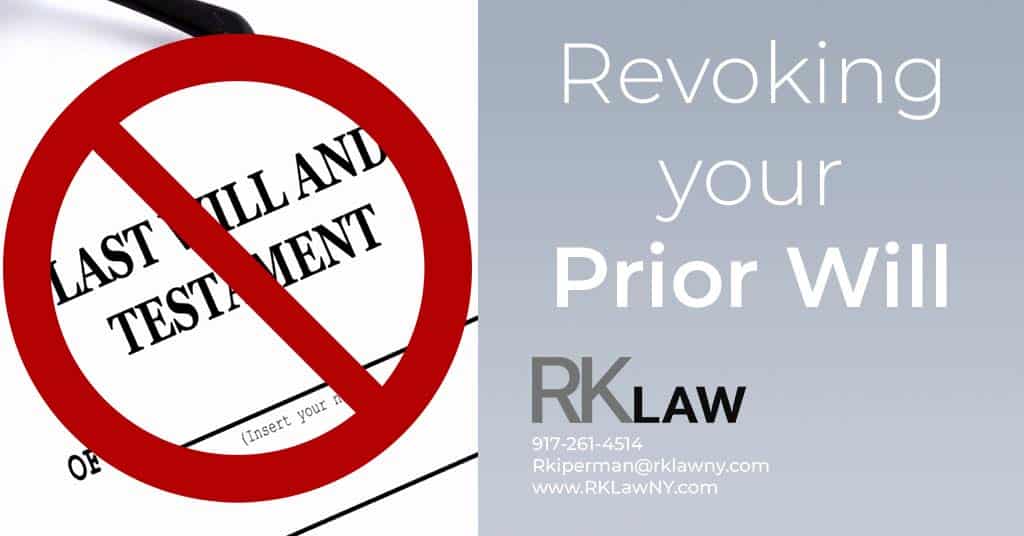Remember to Revoke Your Prior Will
A Last Will and Testament (“Will”) is a legal document by which you can set forth your wishes for how your property should be distributed upon your death. It’s a set of instructions to your family members. Every time you create a new Will, you should remember to revoke your prior Will. Failure to revoke a prior will may result in unintended consequences such as being forced to secure jurisdiction over adversely affected distributees.
Why Would You Want a New Will?
A Will is an important document for everyone. Along with setting forth the distribution scheme, it also allows you to choose who you would want to distribute your assets. Over time, you may want to make changes to your existing Will. You may want to change who you are leaving your money to, what assets you are designating in your Will or who will be the Executor. You can make changes either by making a new Will or doing a codicil to an existing Will. Any change to your Will requires you to revoke your Will in whole (if you are executing a new Will), or in part, if you are executing a Codicil.
Virtually all of the “new” Wills and Codicils will contain language in the Will wherein you expressly revoke the prior Wills. However, this language, standing along, is not sufficient to properly revoke a prior Will. Indeed, the “revocation” of the prior Will only takes effect upon the admission to probate of the current Will or the current Will and Codicil. This begs the question:
How Do you Revoke your Prior Will?
The revocation of a prior Will requires an affirmative act on the part of the testator. Indeed, pursuant to EPTL 3-4.1(a)(2), the testator may revoke his or her Will by burning, tearing, cutting, canceling, obliterating, or otherwise mutilating or destroying the will. Further, the testator may have another party revoke the will by such physical act if done in the presence and at the direction of the testator, provided it can be proved by at least two witnesses other than the person who performed the act of revocation.
A Will may also be revoked by a writing of the testator that clearly indicates an intention to revoke or alter the will, and is duly executed in accordance with the formalities required for a will as provided in EPTL 3-2.1
A Will can also be partially revoked. For example, a testator can secure two witnesses and mark out a bequest by writing “delete” and the date by the obliterated bequest. The testator can then ask the witnesses to initial next to the words.
What if you Don’t Revoke your Prior Will
If you do not revoke your prior Will, your Executor may be required to probate it. If your old Will is filed with the Court for safekeeping and the beneficiaries of the old Will get less than under the new Will, these beneficiaries may be considered “adversely affected parties” and will very likely need to be given a Citation, rather than issued a Notice of Probate. (This means that you will have to secure jurisdiction over the adversely affected parties, which may cause delays and added expense in the probating of the Will).
In some instances, however, having an older Will can be evidence of your thought process and in excluding certain people. If ten prior Wills over a span of ten years exclude a particular family member, then it’s easier to form an argument that you intended to exclude that person.
What Alternatives are Available If I Do Not Want to Deal with Will Revocation?
Instead of doing a Will, you can do a Trust. Trusts are private documents. You can make amendments to the Trusts easily. In addition, when it comes time to administer the Trust, you Successor Trustee will take over for you immediately after your death. As long as you have all amendments together, your Trustee will have the directions necessary to administer the estate. The Trustee will not need Court involvement and the Trustee will not need to obtain any signatures from beneficiaries, past or present, in order to administer your estate. As a result, you do not provide a forum for the beneficiary to contest the Trust. If they want to, they will have the onus of initiating a Court proceeding, as opposed to with a Will, when you hand them the forum on a silver platter.
We can help you revoke your prior will and figure out the estate planning documents that work best for you. Contact us to learn more.
For more information, please contact NYC Probate Litigation, Guardianship, NYC Probate and Estate Planning attorney Regina Kiperman:
Phone: 917-261-4514
Fax: 929-556-2089
Email: rkiperman@rklawny.com
Or visit her at:
40 Wall Street
Suite 2508
New York, NY 10005
Visit Regina on LinkedIn
Visit Regina on Facebook
This page is made available by the lawyer for educational purposes only as well as to give you general information and a general understanding of the law, not to provide specific legal advice. By using this site you understand that there is no attorney client relationship between you and the lawyer. The post should not be used as a substitute for competent legal advice from a licensed professional attorney in your state. ATTORNEY ADVERTISING.
